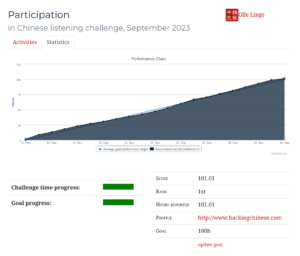 The more you listen, the more you learn. The more you read, the more you learn. Input is absolutely essential when learning Chinese, as it helps you build an accurate mental model of the meaning of words and how they relate to each other, how they are used in context and the way they are combined to form phrases and sentences.
The more you listen, the more you learn. The more you read, the more you learn. Input is absolutely essential when learning Chinese, as it helps you build an accurate mental model of the meaning of words and how they relate to each other, how they are used in context and the way they are combined to form phrases and sentences.
While reading has its own benefits, listening helps you master the sounds, tones and prosody of Mandarin. Listening to massive amounts of Chinese is also considerably more practical than reading for the same duration, as listening can be combined with many everyday activities. To summarise: Listening a lot is hugely beneficial for your Chinese, and listening more is easy!
Tune in to the Hacking Chinese Podcast to listen to the related episode:
Available on Apple Podcasts, Google Podcast, Overcast, Spotify, YouTube and many other platforms!
I listened to 100 hours of Chinese in three weeks…
 As an experiment, I set a goal of listening for one hundred hours during last month’s listening challenge. That’s about five hours per day for three weeks, which is not bad considering that I live in Sweden, work full-time, don’t study Chinese in any formal sense and didn’t count conversations or any form of background listening, such as music.
As an experiment, I set a goal of listening for one hundred hours during last month’s listening challenge. That’s about five hours per day for three weeks, which is not bad considering that I live in Sweden, work full-time, don’t study Chinese in any formal sense and didn’t count conversations or any form of background listening, such as music.
The goal of this article is not to boast about an achievement, however, but to show you that you can and should listen much more than you do and that it’s perfectly possible to do that without it encroaching too much on your life. If you have kids or other very time-consuming social commitments, averaging five hours of listening per day may not be feasible, but you can surely listen more than you do. If you’re not an advanced learner, you’ll find it harder to listen as much as I did, but I promise that you can listen more than you do.
…and here’s how you can, too!
Depending on your previous experience with listening to podcasts, audiobooks, radio and the like, you may think that five hours a day in any language is either quite reasonable or completely crazy. I normally listen to spoken audio for at least a few hours daily, although not often five or more. I have listened to a hundred audiobooks in English in one year more than once.
I bring this up because I think the issue of listening more in Chinese should be discussed from two angles:
- Increasing how much you listen to spoken audio in general
- Increase how much of what you listen to is in Chinese
These two are not completely separate, but I think it makes sense to cover them one at a time.
How to listen more to spoken audio in any language
The reason I listen to spoken audio a lot, regardless of language, is because I enjoy it. I’m interested in the books I listen to and find the podcasts I subscribe to enlightening, entertaining or both. Listening more is in itself not the goal; it’s just that there are so many interesting things to listen to. Therefore, if you want to listen more, it’s essential that you find things to listen to that you find interesting or enjoyable.
Still, most people don’t listen to spoken audio for five hours a day, and it’s not necessarily because there isn’t content they would find interesting. Like many other things in life, listening a lot is about building solid habits.
If your current daily diet of listening contains an occasional podcast and a couple of videos on YouTube, you’ll find it hard to quintuple that overnight, even if you’re listening in your native language. You might be able to do so for one day, but not every day for an extended period. Thus, you need to build up your capacity to listen over time.
So, if you want to listen more, you must invest some energy to make it happen. This doesn’t mean that it can’t also be interesting and enjoyable, but changing aspects of how you live your life does require effort. Here are some more specific tips and tricks:
- Make sure you always have something to listen to, even when offline
- Explore to find content you’re truly interested in
- Vary your listening to make it more enjoyable
- Get wireless earphones (cheap ones will do)
- Get backup earphones so you can listen while the other pair charges
- Gradually form solid listening habits
- Solve any practical problems that might stop you from listening
This advice was largely taken from this article: 7 ideas for smooth and effortless Chinese listening practice
7 ideas for smooth and effortless Chinese listening practice
Still, this website is called Hacking Chinese, and this article is about improving how much Chinese you listen to, so let’s focus on that aspect for the rest of the article.
How to listen more to Chinese
I think the general issues discussed above are essential if you want to increase the amount of Chinese you listen to significantly. For example, I probably doubled the amount of spoken audio I listened to simply by buying wireless earphones. That has nothing to do with listening to Chinese in particular, but I’m mentioning it here again to highlight the importance of the practical aspects of listening more.
However, listening a lot in your native language does not automatically mean that you’ll be able to listen as much to Chinese, even if you want to. And that’s also an issue: How much do you really want to listen? You only have so much time available for listening, and if you increase how much you listen to Chinese, you will have to skip other things you’re listening to now. Since you’re reading this article, though, I assume you’re willing to make some sacrifices in this area.
Here are some important considerations, adapted from the same article linked to above:
- Have audio at a suitable level available – You can vary the difficulty of what you listen to according to how much energy you have to dedicate to listening. There are many ways you can listen, so only having challenging content with tons of new words is not a good idea. You need the full range, from background listening via passive listening to active listening. If you want to listen a lot, you must make sure that there’s always something suitable to listen to, regardless of what situation you’re in.
- Make Chinese the default option – According to the forking path approach, listening more is all about small choices. However, you can nudge yourself in the right direction by making sure Chinese is the default choice whenever possible. There’s ample evidence showing that you are more likely to stick with the default option than make an effort to change. Deliberately make it harder to listen to things that aren’t Chinese. If you followed the advice above to make sure it’s easy to get started listening to Chinese, then do the opposite for your native language and make it harder to access the content.
- Make Chinese the only option – Instead of allowing yourself to choose, simply remove all other options. This requires you to be resolute once, and then subsequent listening becomes easier. If you delete all English music from your phone or unsubscribe from everything that isn’t in Chinese, you don’t have much choice, do you? This is similar to studying with a no-English rule and won’t suit everybody, of course. Personally, I think this works best to get started, but I’m not willing to forego all listening in other languages, so this option is too extreme, especially in the long run.
If you want even more advice on how to do this without leaving the comfort of your home, check Immersion at home or: Why you don’t have to go abroad to learn Chinese.
Immersion at home or: Why you don’t have to go abroad to learn Chinese
Some reflections on listening content and difficulty
There are at least two major differences between listening to one hundred hours of Chinese in three weeks and doing the same in English (or any other language you’re strong in).
- Content – If you listen a lot in English, you will have already found content you find engaging. This is unlikely to be available in Chinese, which means you have to start the search all over again.
- Difficulty – Listening is only interesting if you understand the content, and unless you’re already an advanced student, not understanding what you’re listening to is an issue.
Solving both these problems at the same time is not easy. For beginners, it might be almost impossible because if the things you are interested in can’t be discussed using basic Chinese, you might think the listening material available is simply not compelling. That might be okay if you’re going to listen for twenty minutes, but it won’t work if you want to listen for five hours.
I have done my best to help beginners solve this issue here: Beginner Chinese listening practice: What to listen to and how.
Beginner Chinese listening practice: What to listen to and how
This means that listening more becomes easier the better your listening ability is. I doubt it’s practical to listen to five hours of Chinese every day if you started learning Chinese last week, and even if it’s possible, it’s going to be mind-numbingly boring. The more Chinese you learn, the more options you have. I have done my best to collect my best recommendations for free listening content suitable for beginner, intermediate and advanced students:
The 10 best free Chinese listening resources for beginner, intermediate and advanced learners
Understanding what you listen to is important not only because it makes it more interesting but also because it greatly increases your chances of learning something from the experience. It’s beyond the topic of this article to talk about comprehensible input, but if you haven’t already, you should check my article about it here, as well as this series of articles by Diane Neubauer:
- An introduction to comprehension-based Chinese teaching and learning
- The benefits of a comprehension-based approach for teaching and learning Chinese
- A student’s guide to comprehension-based learning
An introduction to comprehension-based Chinese teaching and learning
It’s not only about how difficult the Chinese is
I said above that you should make sure to have something suitable to listen to for every occasion. This is not as straightforward as it might seem because what is “suitable” depends on at least four factors. I’ll introduce each below and add some comments from my own listening experiment last month:
 How hard the language is – This ought to be fairly obvious; if the audio contains difficult words or grammatical structures or is presented with an unfamiliar accent, listening will be harder. For example, I listened to Chinese audiobooks with a narrator who has a standard accent. In case you wondered, listening to Chinese is hard!
How hard the language is – This ought to be fairly obvious; if the audio contains difficult words or grammatical structures or is presented with an unfamiliar accent, listening will be harder. For example, I listened to Chinese audiobooks with a narrator who has a standard accent. In case you wondered, listening to Chinese is hard! How familiar you are with the topic – Don’t underestimate how much this matters! Listening to someone explaining how multiplication works in Chinese is much easier than listening to someone explaining quantum mechanics. Having relevant background information, as well as information about the content itself, makes listening much easier. When it comes to my listening challenge, I focused partly on books I had already read in English, although two decades ago, which was easier than listening to audiobooks where I had no clue about the plot or setting in advance. The most extreme form of familiarity is if you listen to the same audio again.
How familiar you are with the topic – Don’t underestimate how much this matters! Listening to someone explaining how multiplication works in Chinese is much easier than listening to someone explaining quantum mechanics. Having relevant background information, as well as information about the content itself, makes listening much easier. When it comes to my listening challenge, I focused partly on books I had already read in English, although two decades ago, which was easier than listening to audiobooks where I had no clue about the plot or setting in advance. The most extreme form of familiarity is if you listen to the same audio again. How complex the structure of the text is – This mostly applies to longer texts, such as novels, but be aware that some texts are inherently more complex than others. To bring up a concrete example from last month’s listening challenge (I’ll list everything I listened to below), I found Hyperion by Dan Simmons quite hard to listen to in Chinese. It’s essentially a collection of short stories bound together to form a narrative, sometimes in a non-linear way. This is much harder to follow than a long, straightforward narrative. This means that listening to long-form content is actually easier than listening to short clips.
How complex the structure of the text is – This mostly applies to longer texts, such as novels, but be aware that some texts are inherently more complex than others. To bring up a concrete example from last month’s listening challenge (I’ll list everything I listened to below), I found Hyperion by Dan Simmons quite hard to listen to in Chinese. It’s essentially a collection of short stories bound together to form a narrative, sometimes in a non-linear way. This is much harder to follow than a long, straightforward narrative. This means that listening to long-form content is actually easier than listening to short clips. How much mental capacity you have for focusing on the audio – Naturally, I didn’t spend five hours per day only listening to Chinese; I did other things in parallel all the time. I have covered that in detail in several other articles (here and here), but the point is that some tasks are more demanding than others. When I go for a 10k run, I can probably focus on the audio better than if I sit still in a dark room, but when I do some menial work, such as working with tables in Excel, I can’t listen to something too complex.
How much mental capacity you have for focusing on the audio – Naturally, I didn’t spend five hours per day only listening to Chinese; I did other things in parallel all the time. I have covered that in detail in several other articles (here and here), but the point is that some tasks are more demanding than others. When I go for a 10k run, I can probably focus on the audio better than if I sit still in a dark room, but when I do some menial work, such as working with tables in Excel, I can’t listen to something too complex.
Figuring out how to balance these four factors is not easy, which further highlights the need to experiment and the importance of having different kinds of audio available. If you think it’s too hard to listen to this podcast while you do the laundry, save it for when you take a walk later. If you think that the audio version of your favourite graded reader is getting too easy, combine it with more demanding parallel tasks.
Time quality: Studying the right thing at the right time
Here’s what I listened to in September
 Almost all my listening was in the form of audiobooks, all from the same narrator to boot:
Almost all my listening was in the form of audiobooks, all from the same narrator to boot:
- 新春 (New Spring, Robert Jordan)
- 海伯利安 (Hyperion, Dan Simmons)
- 海伯利安的陨落 (The Fall of Hyperion, Dan Simmons)
- 霍比特人 (The Hobbit, J.R.R. Tolkien)
I also listened to half of 世界之眼 (The Eye of the World, Robert Jordan), but then discovered that this is a work in progress by the narrator, so I’ll return to it in the next listening challenge to see how he’s doing! If you want to check him out on Bilibili, here’s a link: 可爱的文子是米糕.
Beyond that, I also spent some time with 李永乐老师, both on YouTube (new videos) and in audio-only format (old videos). I also watched some eSports commentary for Valorant in Chinese, which I will write about later in more detail.
Conclusion: Listen more; learn more
And that’s how I listened to one hundred hours in three weeks in September. A big shoutout to Cliff Larsen, whom I traded the first spot with on the leaderboard throughout the challenge. We both reached 100 hours; well done!
I hope to see you in the next listening challenge, but don’t wait for that! I you want to be able to double or triple your listening by then, you should start today!
Update: In the January 2024 listening challenge, I was able to listen to a whopping 145 hours, almost 50% more than in the challenge discussed here. The lessons I learnt are mostly the same, though, but if I rewrote this article today, I would emphasise long-form content even more!

2 comments
Hi! Nice content!
Where do you get your audiobooks from?
Sometimes it is hard to access some apps from overseas (such as lizhiFM).
Thanks!
Hi!
I included a link in the article to the channel on Bilibili where I got all the audiobooks for this channel. In general, though, simply searching for the audiobook you’re after actually does work sometimes. You can also check audio platforms like Ximalaya or general video sharing platforms like Bilibili; even YouTube works sometimes!
Best wishes,
Olle